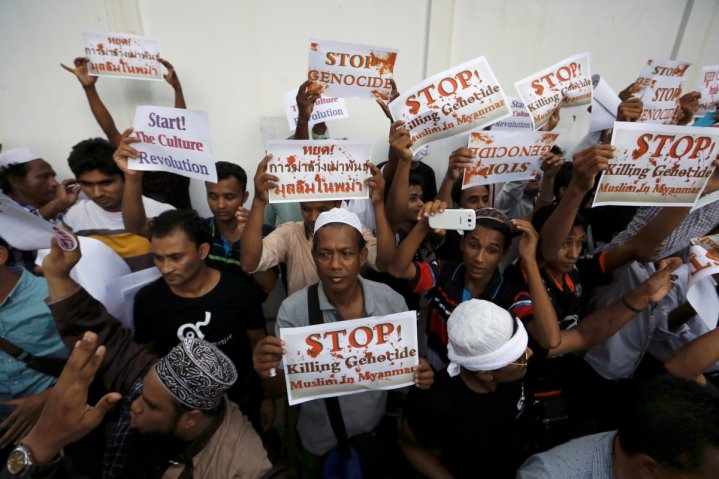
A Rohingya militant outfit that attacked Myanmar border patrol camps in October and killed nine officers have links to Saudi Arabia and Pakistan, a global think tank has said.
The International Crisis Group (ICG) said in a report that it interviewed members of the Harakah al-Yakin militant Rohingya group, which took responsibility for the attacks on Myanmar military outposts in the restive Rakhine province.
The Brussels-based think tank said the leaders of Harakah al-Yakin, or The Faith Movement, have links to Saudi Arabia and Pakistan. ICG said while Afghan and Pakistani fighters secretly trained groups of villagers in the restive northern Myanmar province of Rakhine, the leader of the militant outfit has close links with Saudi Arabia.
Fed on Facebook and jihadism, Singapore maid becomes suicide bomber in Jakarta
Ata Ullah, the leader of Harakah al-Yakin (HaY), was born to Rohingya refugees in Pakistan's Karachi and he lived in Mecca where he was trained and indoctrinated. The report also says a headquarters of the Rophingya movement has been set up in Mecca where they also have a 20-strong Rohingya emigrees oversight committee.
Myanmar's de facto ruler and Sate Counselor Aung San Suu Kyi has termed the Harakah al-Yakin "terrorists" but the ICG says Ata Ullah has not called for attacks on Myanmar Buddhists. The movement says it stands for rights for the persecuted community and that its armed uprisings are only against government assets.
According to the UN, more than 30,000 Rohingya have fled the country after violence escalated in October, triggering a humanitarian crisis. Myanmar retaliated against the attack on army outposts by killing dozens of insurgents. Making matters worse, Bangladesh blocked its borders, trapping the fleeing Muslim minority in no-man's land. A bloody uprising and its devastating backlash in 2012 had killed more than 100 Rohingya and sent about 120,000 refugees into Bangladesh.
The latest Myanmar crackdown on the 'stateless' Rohingya people started after an armed militant raid of three Myanmar border posts last month that killed nine officers. Myanmar troops killed eight assailants in the counter attack and clashes continued on the following days, triggering massive exodus of the local people looking for cover within Bangladesh borders.
Cashless Indian youth murders courier boy who delivers his high-end phone
The motive of the attack on Myanmar border posts was the Myanmar government's decision to pull down illegally built mosques and other religious buildings in the townships, local news outlets reported. The Buddhist nationalists in Myanmar call Rohingya illegal immigrants from Bangladesh while rights organisations call them one of the world's most persecuted peoples. The 1.1 million stateless Rohingya people in Myanmar say they belong there as their predecessors have lived in the country for generations. Thousands of Rohingya people live in refugee camps, in deplorable conditions.
Stateless people
Myanmar's Rohingya crisis has remained unsolved for decades despite international rights agencies raising voice against their suppression in a land where they have lived for generations.
The Buddhist nationalists in Myanamr call Rohingya illegal immigrants from Bangladesh while rights organisations call them one of the world's most persecuted peoples. The 1.1 million stateless Rohingya people in Myanmar say they belong there as their predecessors have lived in the country for generations. Thousands of Rohingya people live in refugee camps, in deplorable conditions.









